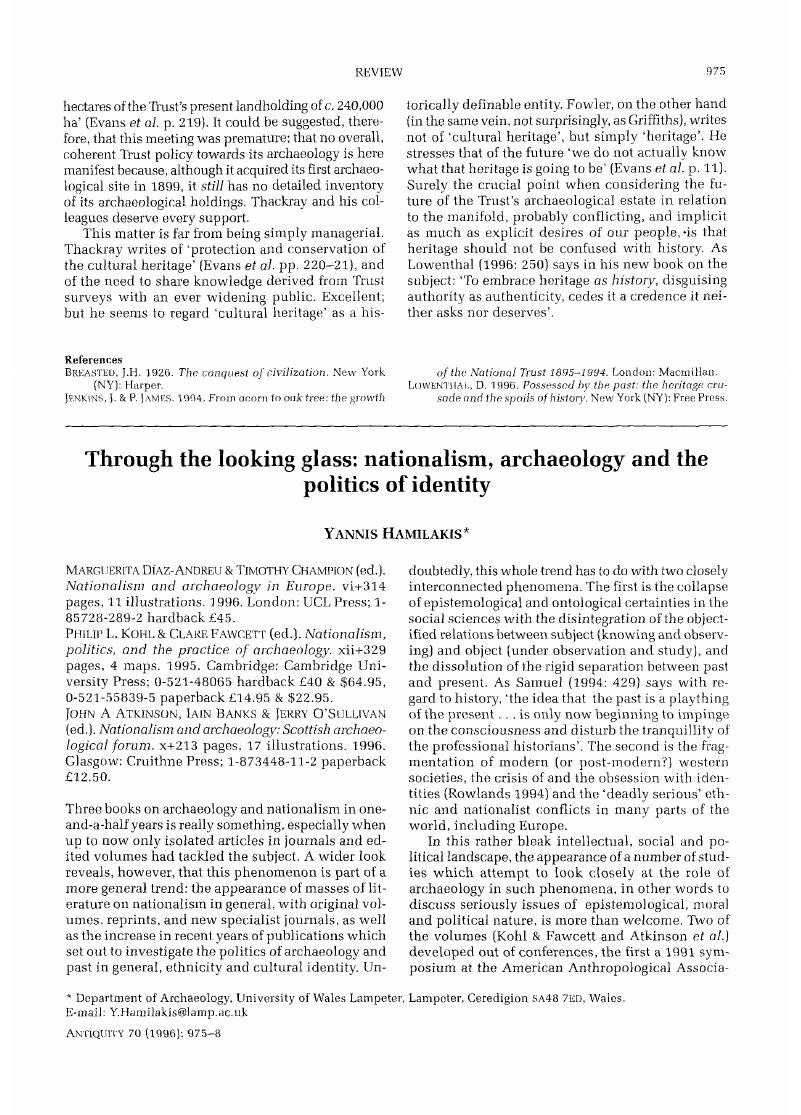Crossref Citations
This article has been cited by the following publications. This list is generated based on data provided by Crossref.
Raven, Diederick
1997.
Beyond Relativism?.
Archaeological Dialogues,
Vol. 4,
Issue. 2,
p.
185.
1997.
Relativism, Objectivity and the Politics of the Past.
Archaeological Dialogues,
Vol. 4,
Issue. 2,
p.
164.
Veit, Ulrich
1997.
On the Relativity of Relativism.
Archaeological Dialogues,
Vol. 4,
Issue. 2,
p.
188.
Hodder, Ian
1997.
Relativising Relativism.
Archaeological Dialogues,
Vol. 4,
Issue. 2,
p.
192.
Pluciennik, Mark
1998.
Archaeology, archaeologists and ‘Europe’.
Antiquity,
Vol. 72,
Issue. 278,
p.
816.
Diaz-Andreu, Margarita
1999.
Multiple readings of the same Golden Age.
Archaeological Dialogues,
Vol. 6,
Issue. 2,
p.
136.
Silberman, Neil Asher
1999.
From Sacralising to Sacrilege? Possible Alternative Relationships of Religion, Nationalism, and Archaeology.
Archaeological Dialogues,
Vol. 6,
Issue. 2,
p.
139.
Hamilakis, Yannis
and
Yalouri, Eleana
1999.
Sacred pasts, profane performances: A reply.
Archaeological Dialogues,
Vol. 6,
Issue. 2,
p.
149.
Sutton, David
1999.
Continuities: Essentialist or Sensory?.
Archaeological Dialogues,
Vol. 6,
Issue. 2,
p.
142.
Alexandri, Alexandra
1999.
Of acts and words.
Archaeological Dialogues,
Vol. 6,
Issue. 2,
p.
146.
Hamilakis, Yannis
and
Yalouri, Eleana
1999.
Sacralising the Past.
Archaeological Dialogues,
Vol. 6,
Issue. 2,
p.
115.
MESKELL, LYNN
2000.
The Practice and Politics of Archaeology in Egypt.
Annals of the New York Academy of Sciences,
Vol. 925,
Issue. 1,
p.
146.
Hamilakis, Yannis
2000.
Cyberspace/cyberpast/cybernation: Constructing Hellenism in hyperreality.
European Journal of Archaeology,
Vol. 3,
Issue. 2,
p.
241.
Kaeser, Marc-Antoine
2002.
On the international roots of prehistory.
Antiquity,
Vol. 76,
Issue. 291,
p.
170.
Scott, Julie
2002.
World Heritage as a Model for Citizenship: the case of Cyprus.
International Journal of Heritage Studies,
Vol. 8,
Issue. 2,
p.
99.
Helmreich, Stefan
2003.
Spatializing Technoscience: The Anthropology of Science and Technology and the Making of National, Colonial, and Postcolonial Space and Place.
Reviews in Anthropology,
Vol. 32,
Issue. 1,
p.
13.
Finneran, Niall
2003.
The Persistence of Memory: Nationalism, Identity and the Represented Past. The Ethiopian Experience in a Global Context.
Studies in Ethnicity and Nationalism,
Vol. 3,
Issue. 1,
p.
21.
Lazzari, Marisa
2003.
Archaeological Visions.
Journal of Social Archaeology,
Vol. 3,
Issue. 2,
p.
194.
Zhang, Juyan
and
Cameron, Glen T.
2004.
The structural transformation of China’s propaganda: An Ellulian perspective.
Journal of Communication Management,
Vol. 8,
Issue. 3,
p.
307.
Simandiraki, Anna
2005.
Minoan archaeology in the Athens 2004 Olympic Games.
European Journal of Archaeology,
Vol. 8,
Issue. 2,
p.
157.



